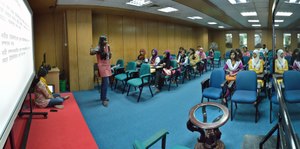seminar
A seminar is a learning and teaching event that is used to interactively acquire or deepen knowledge in small groups. Seminars are held by a seminar leader or trainer .
history
The term seminar (Latin seminarium ) can be traced back to the Latin expression seminare (“sowing”) or seminarium (“planting place, tree nursery , nursery”) from the 16th century. This type of course was offered at the beginning of idealism in the 18th and 19th centuries. Re-introduced in the 19th century. As in the medieval Universitas , the students were seen as equal participants in the scientific work.
Seminars at universities
Seminars at universities (sometimes also called academic seminars ) serve to deepen scientific knowledge and can be offered on any subject in the subject. In contrast to the lecture , they are characterized by greater interactivity between the instructor and the seminar participants. For this purpose, work should be carried out in small, clear groups (around five to twenty participants), with exercises, discussions and presentations by the students ( learning through teaching ). At the end of a seminar there is often a seminar paper to be written or an occasional written exam to be completed. The science that researches and teaches efficient teaching and learning in seminars is called university didactics . In reality, the requirement to work intensively in a small group is often opposed to a number of participants of 40 to 100 students at some German universities. There seminars are often "lectures given by students with not that many listeners" or "lectures in which the lecturer involves the students through questions, feedback or other activities."
Sometimes a distinction is made between proseminars for beginners in the basic course and intermediate , advanced and advanced seminars for students in the main course . Advanced seminars are located as special seminars after the advanced seminar. Occasionally, such an advanced seminar for exam candidates is also called a private seminar or exam colloquium . Seminars are usually held by lecturers . Only rarely and only in certain subjects are students in higher semesters allowed to lead a seminar. Main and advanced seminars are usually only allowed to be held by professors or other professors who have qualified as professors.
A special form of seminar is the research seminar , in which researchers present unpublished research results in order to receive helpful suggestions and criticism. The focus here is not on imparting knowledge, but on scientific exchange.
Seminars in adult education
Seminars in the context of adult education , in-company training , the adult education center or as events from other educational institutions or youth education are interactive learning events with a workshop character. Modern methodology and didactics determine the work in learning groups ( social learning ). The seminar leader creates a learning climate in which the learners find the best possible conditions for independent learning. This learning is mostly experience-oriented ( action- oriented teaching ).
literature
- Elaine Biech: Successfully running courses and seminars for dummies. Wiley-VCH, Weinheim 2008, ISBN 978-3-527-70428-6 .
Web links
Individual evidence
- ↑ Seminar . In: Meyers Großes Konversations-Lexikon . 6th edition. Volume 18, Bibliographisches Institut, Leipzig / Vienna 1909, pp. 327–328 .
- ^ Ulrich Breuer, Matthias Emrich: Seminar . In: Ute Frietsch, Jörg Rogge (Hrsg.): About the practice of cultural studies. A concise dictionary . transcript, Bielefeld 2013, ISBN 978-3-8376-2248-5 , p. 376 ff .
